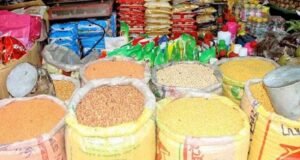
Prices of essential commodities continue to rise at kitchen markets across the country, putting people, especially the low and lower-middle income group, into a tight corner.
Consumers alleged that some traders are increasing the prices of essentials for lack of market monitoring by the authorities concerned.
They also demanded that the government take steps to arrest the spiralling prices to give them some relief.
The prices of four commodities — onion, potato, garlic and ginger — have increased abnormally soon after Eid-ul-Fitr.
Besides, beef, egg, local chicken, edible oil and most of the vegetables are also retailing at higher prices.
The people with limited income are now struggling to cope with the rising costs of living due to the continuous rise in the commodity prices.
Many had to drop some items from their menu as they are not able to make any further adjustments to their budgets.
Many others have been compelled to borrow money from different sources for their survival.
Amirul Islam, a private service holder, told the Daily Sun that the prices of all protein sources – be it meat or fish — have long been out of their purchasing power. “And now the prices of vegetables are also beyond our purchasing power.”
“We have to spend at least Tk 1,000 to buy vegetables for each week. Prices of most of the vegetable are more than Tk 60 per kg,” he said, adding that lack of market monitoring and surveillance against the market manipulators is responsible for the indiscriminate price hike.
Sohel Hossain, a consumer at Mirpur-6 Kitchen Markets, said he had been able to buy all the daily essentials of his family for the whole week between Tk 2,000-3,000 in the past. “But now, with the price hike, it’s not possible to buy some of the necessary commodities with that amount. I’m leaving the market without buying some essential items for lack of money,” he said.
The price of onion has jumped to Tk 70 per kg from Tk 50-60 per kg in a week. The essential cooking item was retailing at Tk 35 per kg just before Eid.
On Thursday, the government increased the price of loose sugar to Tk 120 a kg and that of packaged one to Tk 125 each kg with a hike of Tk 16 per kg. However, the sweet substance was selling at much higher price in the market – loose one at as high as Tk 140 per kg.
The ginger price has hit an all-time high as its maximum retail price was Tk 300-340 per kg on Friday.
It sold at Tk 90-120 per kg during this period last year.
The price of imported garlic has increased by Tk 20-30 per kg to Tk 140-160. Local garlic price was Tk 120-130 per kg and that of the imported one Tk 130 per kg ahead of Eid.
The price of bottled soybean oil has increased to Tk 199 from Tk 187 per litre while that of loose one to Tk 176 from Tk 168 per litre and palm oil price has been raised to Tk 135 per litre.
The new bottles are yet to appear in the market, but traders are allegedly charging new price from the consumers for the old bottles.
Apart from potatoes, no other vegetables can be found in the market for less than Tk 60 per kg.
Vegetables with relatively low demand like papaya and radish have also got costlier selling at Tk 80 per kg.
Although the price of potatoes had been low for a long time, it has increased by Tk 10 per kg in the last few weeks to Tk 35-40 per kg.
While visiting the Mirpur-6 Kitchen Market, this correspondent found that the prices of new vegetables have increased in the last 2-3 days.
Brinjal, pointed gourd and radish are selling at Tk 60-80 per kg, ribbed gourd, bitter gourd, sponge gourd, okra, snake gourd, yardlong bean at Tk 80-100 per kg and drumstick was retailing at Tk 120-140 a kg.
The green chilli price increased to Tk 140-160 per kg from Tk 60 in a week.
Consumers cannot even buy tilapia or pangas fish for less than Tk 220 per kg in the market.
Cultivated ruhi and katla are selling at Tk 320-350 per kg while local open water fish tengra and boal are available for as high as Tk 800 each kg.
Broiler chicken was selling at Tk 220 per kg and Sonali chicken at Tk 340-360 per kg. The farm egg price was Tk 140-150 per dozen.
 Weekly Bangla Mirror | Bangla Mirror, Bangladeshi news in UK, bangla mirror news
Weekly Bangla Mirror | Bangla Mirror, Bangladeshi news in UK, bangla mirror news







